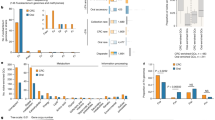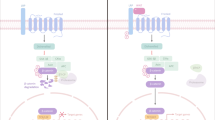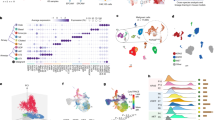Abstract
In IBD patients, integration between a hyper-activated immune system and epithelial cell plasticity underlies colon cancer development. However, molecular regulation of such a circuity remains undefined. Claudin-1 (Cld-1), a tight-junction integral protein deregulation alters colonic epithelial cell (CEC) differentiation, and promotes colitis severity while impairing colitis-associated injury/repair. Tumorigenesis is a product of an unregulated wound-healing process and therefore we postulated that upregulated Cld-1 levels render IBD patients susceptible to the colitis-associated cancer (CAC). Villin Cld-1 mice are used to carryout overexpressed studies in mice. The role of deregulated Cld-1 expression in CAC and the underlying mechanism was determined using a well-constructed study scheme and mouse models of DSS colitis/recovery and CAC. Using an inclusive investigative scheme, we here report that upregulated Cld-1 expression promotes susceptibility to the CAC and its malignancy. Increased mucosal inflammation and defective epithelial homeostasis accompanied the increased CAC in Villin-Cld-1-Tg mice. We further found significantly increased levels of protumorigenic M2 macrophages and β-cateninSer552 (β-CatSer552) expression in the CAC in Cld-1Tg vs. WT mice. Mechanistic studies identified the role of PI3K/Akt signaling in Cld-1-dependent activation of the β-CatSer552, which, in turn, was dependent on proinflammatory signals. Our studies identify a critical role of Cld-1 in promoting susceptibility to CAC. Importantly, these effects of deregulated Cld-1 were not associated with altered tight junction integrity, but on its noncanonical role in regulating Notch/PI3K/Wnt/ β-CatSer552 signaling. Overall, outcome from our current studies identifies Cld-1 as potential prognostic biomarker for IBD severity and CAC, and a novel therapeutic target.
This is a preview of subscription content, access via your institution
Access options
Subscribe to this journal
Receive 50 print issues and online access
$259.00 per year
only $5.18 per issue
Buy this article
- Purchase on Springer Link
- Instant access to full article PDF
Prices may be subject to local taxes which are calculated during checkout








Similar content being viewed by others
References
Sengupta N, Yee E, Feuerstein JD. Colorectal cancer screening in inflammatory bowel disease. Dig Dis Sci. 2016;61:980–9.
Landy J, Ronde E, English N, Clark SK, Hart AL, Knight SC. et al. Tight junctions in inflammatory bowel diseases and inflammatory bowel disease associated colorectal cancer. World J Gastroenterol. 2016;22:3117–26.
Gunzel D, Yu AS. Claudins and the modulation of tight junction permeability. Physiol Rev. 2013;93:525–69.
Pope JL, Bhat AA, Sharma A, Ahmad R, Krishnan M, Washington MK. et al. Claudin-1 regulates intestinal epithelial homeostasis through the modulation of Notch-signalling. Gut. 2014;63:622–34.
Dhawan P, Singh AB, Deane NG, No Y, Shiou SR, Schmidt C. et al. Claudin-1 regulates cellular transformation and metastatic behavior in colon cancer. J Clin Invest. 2005;115:1765–76.
Pope JL, Ahmad R, Bhat AA, Washington MK, Singh AB, Dhawan P. et al. Claudin-1 overexpression in intestinal epithelial cells enhances susceptibility to adenamatous polyposis coli-mediated colon tumorigenesis. Mol Cancer. 2014;13:167
Ouban A. Claudin-1 role in colon cancer: an update and a review. Histol Histopathol. 2018;33:1013–19.
Liu L, Rao JN, Zou T, Xiao L, Smith A, Zhuang R. et al. Activation of Wnt3a signaling stimulates intestinal epithelial repair by promoting c-Myc-regulated gene expression. Am J Physiol Cell Physiol. 2012;302:C277–85.
Deitrick J, Pruitt WM. Wnt/beta catenin-mediated signaling commonly altered in colorectal cancer. Prog Mol Biol Transl Sci. 2016;144:49–68.
Sabatino L, Pancione M, Votino C, Colangelo T, Lupo A, Novellino E. et al. Emerging role of the beta-catenin-PPARgamma axis in the pathogenesis of colorectal cancer. World J Gastroenterol. 2014;20:7137–51.
Goretsky T, Bradford EM, Ryu H, Tahir M, Moyer MP, Gao T. et al. A cytosolic multiprotein complex containing p85alpha is required for beta-Catenin activation in colitis and colitis-associated cancer. J Biol Chem. 2016;291:4166–77.
Miwa N, Furuse M, Tsukita S, Niikawa N, Nakamura Y, Furukawa Y. Involvement of claudin-1 in the beta-catenin/Tcf signaling pathway and its frequent upregulation in human colorectal cancers. Oncol Res. 2001;12:469–76.
Shiou S-R, Singh AB, Moorthy K, Datta PK, Washington MK, Beauchamp RD. et al. Smad4 regulates Claudin-1 expression in a transforming growth factor-β-independent manner in colon cancer cells. Cancer Res. 2007;67:1571–9.
Clapper ML, Cooper HS, Chang WC. Dextran sulfate sodium-induced colitis-associated neoplasia: a promising model for the development of chemopreventive interventions. Acta Pharmacol Sin. 2007;28:1450–9.
Liu Y, Cao X. The origin and function of tumor-associated macrophages. Cell Mol Immunol. 2015;12:1–4.
Waniczek D, Lorenc Z, Snietura M, Wesecki M, Kopec A, Muc-Wierzgon M. Tumor-associated macrophages and regulatory T cells infiltration and the clinical outcome in colorectal cancer. Arch Immunol Ther Exp (Warsz). 2017;65:445–54.
Hermiston ML, Gordon JI. Inflammatory bowel disease and adenomas in mice expressing a dominant negative N-cadherin. Science. 1995;270:1203–7.
Sebio A, Kahn M, Lenz HJ. The potential of targeting Wnt/beta-catenin in colon cancer. Expert Opin Ther Targets. 2014;18:611–5.
Lee G, Goretsky T, Managlia E, Dirisina R, Singh AP, Brown JB. et al. Phosphoinositide 3-kinase signaling mediates beta-catenin activation in intestinal epithelial stem and progenitor cells in colitis. Gastroenterology. 2010;139:869–81.81 e1–9.
Villegas SN, Gombos R, Garcia-Lopez L, Gutierrez-Perez I, Garcia-Castillo J, Vallejo DM. et al. PI3K/Akt cooperates with oncogenic Notch by inducing nitric oxide-dependent inflammation. Cell Rep. 2018;22:2541–9.
Breynaert C, Vermeire S, Rutgeerts P, Van Assche G. Dysplasia and colorectal cancer in inflammatory bowel disease: a result of inflammation or an intrinsic risk?. Acta Gastroenterol Belg. 2008;71:367–72.
Low D, Mino-Kenudson M, Mizoguchi E. Recent advancement in understanding colitis-associated tumorigenesis. Inflamm Bowel Dis. 2014;20:2115–23.
Terzic J, Grivennikov S, Karin E, Karin M. Inflammation and colon cancer. Gastroenterology. 2010;138:2101–14 e5.
Dave M, Loftus EV Jr. Mucosal healing in inflammatory bowel disease—a true paradigm of success? Gastroenterol Hepatol (NY). 2012;8:29–38.
Ullman TA, Itzkowitz SH. Intestinal inflammation and cancer. Gastroenterology. 2011;140:1807–16.
Stidham RW, Higgins PDR. Colorectal cancer in inflammatory bowel disease. Clin Colon Rectal Surg. 2018;31:168–78.
Gonzalez AC, Costa TF, Andrade ZA, Medrado AR. Wound healing—a literature review. Bras Dermatol. 2016;91:614–20.
Neal MD, Richardson WM, Sodhi CP, Russo A, Hackam DJ. Intestinal stem cells and their roles during mucosal injury and repair. J Surg Res. 2011;167:1–8.
Ormanns S, Neumann J, Horst D, Kirchner T, Jung A. WNT signaling and distant metastasis in colon cancer through transcriptional activity of nuclear beta-Catenin depend on active PI3K signaling. Oncotarget. 2014;5:2999–3011.
Brown JB, Cheresh P, Goretsky T, Managlia E, Grimm GR, Ryu H. et al. Epithelial phosphatidylinositol-3-kinase signaling is required for beta-catenin activation and host defense against Citrobacter rodentium infection. Infect Immun. 2011;79:1863–72.
Parang B, Kaz AM, Barrett CW, Short SP, Ning W, Keating CE. et al. BVES regulates c-Myc stability via PP2A and suppresses colitis-induced tumourigenesis. Gut. 2017;66:852–62.
Ahmad R, Kumar B, Chen Z, Chen X, Muller D, Lele SM. et al. Loss of claudin-3 expression induces IL6/gp130/Stat3 signaling to promote colon cancer malignancy by hyperactivating Wnt/beta-catenin signaling. Oncogene. 2017;36:6592–604.
Mendes RD, Canté-Barrett K, Pieters R, Meijerink JPP. The relevance of PTEN-AKT in relation to NOTCH1-directed treatment strategies in T-cell acute lymphoblastic leukemia. Haematologica. 2016;101:1010–7.
Wong GW, Knowles GC, Mak TW, Ferrando AA, Zúñiga-Pflücker JC. HES1 opposes a PTEN-dependent check on survival, differentiation, and proliferation of TCRβ-selected mouse thymocytes. Blood. 2012;120:1439–48.
He XC, Yin T, Grindley JC, Tian Q, Sato T, Tao WA. et al. PTEN-deficient intestinal stem cells initiate intestinal polyposis. Nat Genet. 2007;39:189–98.
Singh A, Sharma A, Smith J, Krishnan M, Chen X, Eschrich S. et al. Claudin-1 up-regulates the repressor ZEB-1 to inhibit E-cadherin expression in colon cancer cells. Gastroenterology. 2011;141:2140–53.
Balint K, Xiao M, Pinnix CC, Soma A, Veres I, Juhasz I. et al. Activation of Notch1 signaling is required for β-catenin–mediated human primary melanoma progression. J Clin Investig. 2005;115:3166–76.
Leong KG, Niessen K, Kulic I, Raouf A, Eaves C, Pollet I. et al. Jagged1-mediated Notch activation induces epithelial-to-mesenchymal transition through Slug-induced repression of E-cadherin. J Exp Med. 2007;204:2935–48.
Chassaing B, Aitken JD, Malleshappa M, Vijay-Kumar M. Dextran sulfate sodium (DSS)-induced colitis in mice. Curr Protoc Immunol. 2014;104:Unit 1525
Snider AJ, Bialkowska AB, Ghaleb AM, Yang VW, Obeid LM, Hannun YA. Murine model for colitis-associated cancer of the colon. Methods Mol Biol. 2016;1438:245–54.
Erben U, Loddenkemper C, Doerfel K, Spieckermann S, Haller D, Heimesaat M. et al. A guide to histomorphological evaluation of intestinal inflammation in mouse models. Int J Clin Exp Pathol. 2014;7:4557–76.
Acknowledgements
This study was supported by BX002086 (VA merit), CA216746 (NIH/NCI) and a pilot project award from Fred and Pamela Buffet Cancer Center, which is funded by a National Cancer Institute Cancer Center Support Grant under award number P30 CA036727 to P.D. and DK088902 (NIH/NIDDK) and BX002761 (VA merit) to A.B.S.
Author information
Authors and Affiliations
Corresponding author
Ethics declarations
Conflict of interest
The authors declare that they have no conflict of interest.
Additional information
Publisher’s note: Springer Nature remains neutral with regard to jurisdictional claims in published maps and institutional affiliations.
Rights and permissions
About this article
Cite this article
Gowrikumar, S., Ahmad, R., Uppada, S.B. et al. Upregulated claudin-1 expression promotes colitis-associated cancer by promoting β-catenin phosphorylation and activation in Notch/p-AKT-dependent manner. Oncogene 38, 5321–5337 (2019). https://doi.org/10.1038/s41388-019-0795-5
Received:
Revised:
Accepted:
Published:
Issue Date:
DOI: https://doi.org/10.1038/s41388-019-0795-5



